Please activate JavaScript in your browser to use all interface options.
Second Russian-Chinese Energy Business Forum Opens in Saint Petersburg
06 June 2019-350x1000.jpg)
The Second Russian-Chinese Energy Business Forum started in Saint Petersburg as part of the 23rd Saint Petersburg International Economic Forum. This format of the events was established in July 2018, at the request of President of the Russian Federation Vladimir Putin and President of the People’s Republic of China Xi Jinping.
The aim of the Forum is to develop a dialogue between Russia and China in the energy industry, to increase the effectiveness and scope of the joint projects portfolio, and to attract investments.
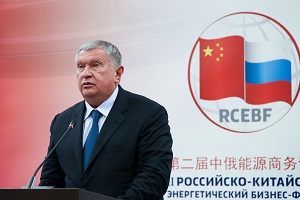 Igor Sechin, the executive secretary of the Presidential Commission on the Strategy for the Development of the Fuel and Energy Industry and Environmental Safety, opened the Forum. In his opening speech, he expressed his gratitude for the participation in organising the event to Director of the National Energy Administration of China Zhang Jianhua and Chairman of the Board of Directors of CNPC Wang Yilin.
Igor Sechin, the executive secretary of the Presidential Commission on the Strategy for the Development of the Fuel and Energy Industry and Environmental Safety, opened the Forum. In his opening speech, he expressed his gratitude for the participation in organising the event to Director of the National Energy Administration of China Zhang Jianhua and Chairman of the Board of Directors of CNPC Wang Yilin.
According to Sechin, the second Forum attracted much interest in the business circles of Russia and China and gathered the heads and representatives of more than 100 corporations. “The total capitalisation of the companies participating in the Forum is close to $3 trillion,” Sechin noted. According to him, the interaction between governmental bodies and business entities will be a characteristic feature of the second Forum.
“The important task for the Forum is to develop standard and transparent rules of doing business, which concern customs, banking and tax regulations. They should help implement mutually beneficial projects in the quickest possible way,” Igor Sechin said.
To further enhance cooperation between the two countries, Sechin called for the financial institutions of Russia and China to actively seek new ways of financing projects and to develop regional banking networks in order to create stable economic ties and improve the investment environment.
According to Sechin, currently, Russian and Chinese electric power companies are converging on such important issues as engineering and construction of nuclear power plants, development of electricity networks, and production and supplies of equipment. Nuclear energy development is a very promising area, which, according to experts, can largely contribute to solving the problems of meeting the steeply rising demand for electricity.
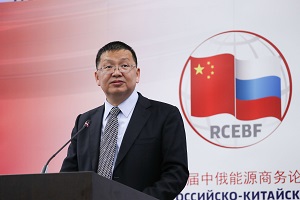 “A large number of companies in the oil and gas, coal, and electric power industries closely interact, the talks between them indicate the growth of mutual understanding and the fact that the Forum creates all conditions and provides ample opportunities for practical joint work,” the Executive Secretary of the Commission on the Strategy for the Development of the Fuel and Energy Industry noted.
“A large number of companies in the oil and gas, coal, and electric power industries closely interact, the talks between them indicate the growth of mutual understanding and the fact that the Forum creates all conditions and provides ample opportunities for practical joint work,” the Executive Secretary of the Commission on the Strategy for the Development of the Fuel and Energy Industry noted.
Sechin distinguished three programme topics that currently define the nature and results of future cooperation between the two countries.
Firstly, the cooperation of Russia and China is becoming a strong factor of influence on the development of the global energy markets. The figures support this: in total, the two states produce more than 30% of fossil energy resources and consume about a third of their volume. In particular, Russia and China provide 17% of global oil and gas condensate output and 20% of their consumption. The energy industry is the foundation of trade and economic cooperation between the two countries: the trade turnover between Russia and China is steadily growing and amounted to $108 billion in 2018.
“These are the tasks that were set by our esteemed leaders, the President of the People’s Republic of China and the President of the Russian Federation, and the task was actually over-fulfilled,” Igor Sechin noted.
“Therefore, the Russian-Chinese cooperation may become a substantial stabilising force at the energy markets. We can conduct joint balanced energy policy in our own interests. Moreover, the biggest opportunities are tied to increasing the mutually beneficial cooperation in the Asia-Pacific Region, which remains the biggest consumer and a net importer of hydrocarbons,” the head of Rosneft added.
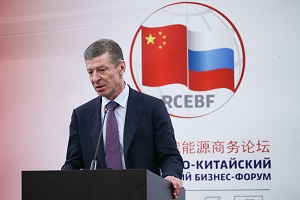 The second most important issue is the task of developing an environmentally friendly conventional energy industry since it is the most efficient and the quickest way to solve the pressing problems in the spheres of ecology and climate change. According to Sechin, technological advancements in refining hydrocarbon commodities and improvement of quality of motor fuels and other oil products allow reducing the negative impact on the environment.
The second most important issue is the task of developing an environmentally friendly conventional energy industry since it is the most efficient and the quickest way to solve the pressing problems in the spheres of ecology and climate change. According to Sechin, technological advancements in refining hydrocarbon commodities and improvement of quality of motor fuels and other oil products allow reducing the negative impact on the environment.
The third programmatic topic is energy and economy of the future which go hand in hand with the development of the Arctic. The resources of the surface part of the Russian Arctic are estimated at 5-10 billion tonnes of oil equivalent, and Russia has just started their development, Sechin noted. He reminded that Rosneft is currently creating an Arctic cluster which will become a development driver of the Arctic area of the Russian Federation.
Resources of the Arctic cluster fields are estimated at 2.6 billion tonnes. The most prospective areas are located in the north of Krasnoyarsk region, close to the Northeast Passage. They have proven reserves of premium quality oil. The reserves require detailed geology research; according to preliminary estimates, annual production might reach 100 mmt by 2027.
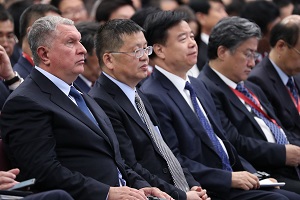 The head of Rosneft also reminded that the Russian government is developing a draft law providing special measures of state support of investment projects in the Arctic area.
The head of Rosneft also reminded that the Russian government is developing a draft law providing special measures of state support of investment projects in the Arctic area.
Equally important is the global transport corridor from Asia to Europe, a part of which is the Northeast Passage. Its use will make transportation from East Asia to Europe 25% faster and 15% cheaper. The project is also beneficial for China - President of China Xi Jinping appealed to the joint construction of the Ice Silk Road.
According to Sechin, cooperation between Russian and Chinese companies shall spread beyond the energy market and include related business areas - integral shipment chains, localisation of modern equipment, new systemic solutions, energy digitalisation, and financial instruments. “This requires active development of collaboration between leading banks and IT-companies of Russia and China,” he concluded.
In his speech, Director of the National Energy Administration of China Zhang Jianhua reminded that the Energy Business Forum was established with the support and upon the personal initiative of President of the People’s Republic of China Xi Jinping and President of the Russian Federation Vladimir Putin.
He stressed that the Russian-Chinese energy cooperation has a fine foundation, vast prospects, and great potential. “The National Energy Administration is ready to actively support the spirit of a comprehensive strategic partnership and will contribute to the development of mechanisms for the functioning of the Russian-Chinese Energy Business Forum, as well as work with relevant departments and agencies to raise the energy cooperation between the two countries to a higher level,” Zhang Jianhua said.
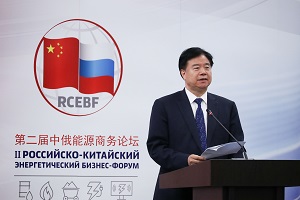 In his turn, Deputy Prime Minister of the Russian Federation Dmitry Kozak told at the opening of the Forum that it represented a fine opportunity to establish business relations between Russian and Chinese partners, to hold discussions, and to build the dialogue between the business and the authorities.
In his turn, Deputy Prime Minister of the Russian Federation Dmitry Kozak told at the opening of the Forum that it represented a fine opportunity to establish business relations between Russian and Chinese partners, to hold discussions, and to build the dialogue between the business and the authorities.
Speaking on the Russian-Chinese energy dialogue, Kozak noted that, according to the assessment by the Government of the Russian Federation, the counties reached a novel level of cooperation that also kept developing dynamically.
Speaking at the opening of the Forum, CNPC Chairman Wang Yilin provided an evaluation of the situation in the world and the state of the global energy market. “The current international situation is not sustainable; there are sharp shifts to be seen. Protectionism has become one of the leading agendas in the policies of certain countries,” the CNPC Chairman said.
According to Wang Yilin, energy cooperation is an important direction and the core area of the Chinese-Russian strategic interaction. “Deepening of the energy cooperation between China and Russia is of significant importance for us to jointly secure the energy safety and to create the open global economy,” he said.
“In recent years, due to the personal support of President Xi Jinping and President Vladimir Putin, CNPC and our Russian oil and gas partners have achieved progress in the cooperation, and we are headed towards implementing vertically-integrated interaction that would embrace the entire production chain,” Wang Yilin noted.
He said that CNPC was willing to make efforts jointly with Rosneft Oil Company to turn the Russian-Chinese Energy Business Forum into an important platform for the energy cooperation of the two countries. “I am sure that today’s Forum will, by all means, play an active part in boosting the constructive and efficient cooperation between Russia and China in energy,” Wang Yilin emphasised.
After the opening ceremony, the parties exchanged folders with the signed agreements. In total, the parties have signed 10 agreements. Rosseti agreed on a strategical partnership with NARI Group Corporation and signed an agreement on implementation of projects of construction and renovation of electricity grid complex objects with China Energy Engineering Corporation. Neftagazholding agreed on collaboration term sheet of Payakha project with China National Chemical Engineering No.7 Construction Co; RusHydro - with PowerChina on the construction of hydro-accumulating power stations; Inter RAO - Export signed an agreement with the China National Machine-Building Corporation (SINOMACH) on strategic collaboration in Russian Federation and third-party countries.
Kolmar Group and Beijing CATIC Industry Ltd. signed a Memorandum on continued cooperation in the development of Inaglinskaya-2 processing factory; “Power Machines” agreed on strategic partnership in energy machine-building with Harbin Electric International; Coalstar and Tangshan Shenzhou Manufacturing agreed on collaboration in the provision of equipment. JSC Neftegazavtomatika and Research Institute No.22 of the Chinese Corporation on Electronic Science and Technology agreed on joint production and disposition of equipment for slant-hole directional drilling of oil and gas wells for Russian oilfield service market. Harbin Electric Corporation, Investments in New Technologies LLC, Amur Surius Energy EPC and Russian-Chinese Investment Fund of Regional Collaboration and Development signed a collaboration agreement for the creation of technologically innovative factory for the production of basic energy equipment in Kaluga special economic zone.
The day before, in Moscow, in the presence of leaders of the Russian Federation and People’s Republic of China Vladimir Putin and Xi Jinping, the parties signed a number of other strategically important documents for the development of bilateral energy dialogue. Rosneft and the National Energy Administration of China signed a provision on Russian-China Energy Business Forum; Sibur and Sinopec signed an agreement on polyethylene distribution within China; Rosatom signed a general contract for construction of two blocks of Xudapu Nuclear Power Plant in China.
Rosneft
Information Division
Phone: + 7 (499) 517-88-97
June 6, 2019
These materials contain statements about future events and expectations that are forward-looking in nature. Any statement in these materials that is not a statement of historical fact is a forward-looking statement that involves known and unknown risks, uncertainties and other factors which may cause actual results, performance or achievements expressed or implied by such forward-looking statements to differ. We assume no obligations to update the forward-looking statements contained herein to reflect actual results, changes in assumptions or changes in factors affecting these statements.

-315xx70.png)

